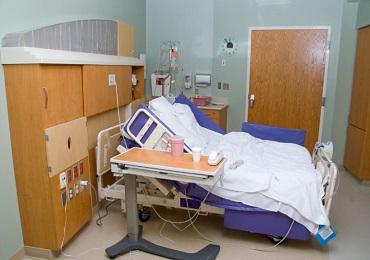Co – Payment Facility: This feature offers the policy holder to lower their cost of the health insurance. Health insurance offers co – payment options with their plans, which states prelude defining of the voluntary deductibles which are to be borne by the firm.
In short according co – payment facility some charges are paid by the policy holder or the subscriber and the rest of the charges are to be paid by the provider. The co – payment option further explains itself as a cost sharing instrument which states that the organization or the person with whom the policy is attached will bear a certain percentage of the charge for the total admissible cost, and the rest will borne by the provider. However the co – payment instrument related to a health plan does not have any effect on the total sum assured against the policy.
Pre-Existing Diseases: It is defined as any condition, aliment, injury or related condition for which a person have signs or symptoms that were either diagnosed or recieved medical treatment or advice within past 48 months before subscribing for a medical policy is know as pre – existing disease. A person should always announce about any pre – existing medical condition in past 48 months to their health insurance company, and take the policy only and after as suggested by health insurance company to get the most benefit possible out of it. For pre – existing conditions sometimes a person maybe charged an additional pre – existing cover charges, but that in turn will work in benefit of the person in long run, incase of medical emergency claims.
Cashless Facility: Every Health insurance providing companies now a days have tie ups with various nursing homes and hospitals across the country. If the policy holder get admitted in one of the tie up nursing home or hospital that his or her insurance company has a tie up with, they will not have to pay anything for treatment in that hospital or nursing home. In such a scenario the insured person only have to announce their policy number to the hospital, and the rest of the monetary dealings and other issue will be taken care of by the hospital and the insurance providing firm.This kind of plans are mostly preferred by the subscribers as there is no stress of claim resolution and document arrangements. However in case the medical expenditure of the policy holder go beyond the sub limit mentioned by the insurance company, or marked not covered by the provider in such a scenario the person having the medical treatment have to settle the amount directly with hospital authority. Further cashless treatment facility is not available to a person, when they take the treatment from a hospital which is not within the network of the health insurance provider.
Domiciliary Hospitalization: Domiciliary treatment means medical treatment for a period exceeding three days for such Disease or Injury which in the normal course would, require care and treatment at the hospital but actually taken whilst confined at home in India under any of the following circumstances namely
The condition of the insured person is such that he/she cannot be removed to the hospital.
The insured person cannot be removed to hospital for the lack of accommodation therein.
However that domiciliary hospitalisation expenses shall not cover expenses incured for pre and post hospital treatment or any expenses incured for treatment of the following diseases.
Asthma Bronchitis Chronic Nephritis and Nephrotic SyndromeDiarrhoea and all type of Dysenteries including Gatro-enteritiesDiabetes Mellitus InsipidusEpilepsyHypertensionInfluenza, Cough and coldAll Psychiatric or Psychosomatic DisordersPyrexia of unknown origin for less than 10 daysTonsillitis and Upper Respiratory Tract Infection includingLaryngitis and PharyngitisArthritis, Gout and Rheumatism
Further domiciliary expenses is limited to 15% or maximum of Rs 50,000 of any one Year limit, to be borne by the health insurance provider of the policy holder.
Grace Period: Some times due to certain issues we might miss the due of paying our monthly premium for our medical insurance policy, in such a scenario the insurance providing company can end the insurance coverage that is supposed to availed to the policy holder. However before the insurance company can end up the coverage of the medical insurance, the policy holder get a short window of making the payment of the premium even after the due date, the short window in case of medical insurance is 90 days. This short window of 90 days within which a policy holder can make the premium payment after due date to continue the medical coverage is known as grace period.
However the Grace period of 90 days is only valid provided the policy holder have a marketplace plan and qualify for advance payments of the premium tax credit. Further if the policy holder have already paid at least one full month’s premium during the benefit year.
Congenital Anomaly: Congenital anomalies are also known as birth defects, congenital disorders or congenital malformations. Congenital anomalies can be defined as structural or functional anomalies that can be metabolic disorders which occur during intrauterine life and can be identified prenatally, at birth, or sometimes may only be detected later in infancy, such as hearing defects.
In simple terms, congenital refers to the existence at or before birth. Further the medical insurance providing companies in India does not provide cover for congential anomaly. However to protect a new born, the best thing parents can do is fill up the later additional clause form of family health insurance during maternity, and pay up an additional premium value for the same, to get the new born protected under the health insurance. However the new born can only be added to the coverage of health insurance plan post 91 days of birth. This is the only way of protecting new born with congenital anomaly. However an adult person whose birth defect remained undetected till adulthood cannot be provided coverage under medical insurance for congential disease.
Portability: Health insurance companies provide a person with the option of portability, in case of portability a person can move from one health insurance company to another without losing the advantage of continuity. The continuity will cover all the pre existing ailments and also includes the time boundary exclusion and waiting period that was previously earned by the subscriber in the earlier policy. In case of portability a subscriber has to initially switch to a plan offered by the current health insurance service provider and thereafter the subscriber can move to another firm of their choice. With portability option subscribers can now try out policies of their choice with their preferential insurance providing organization.
Free Look Period: When a person buys a Health insurance policy and recieve their policy documents, sometimes the subscriber are not satisfied with the terms and condition provided by the insurance company. In such a scenario it is not necessary for the subscriber to forcefully accept the policy document or the policy terms. Insurance regulatory development authority introduced this free look period to provide a consumer friendly atmosphere to the policy holders. This free look period can be used by the policy holders to read the terms and condition given on the document and if they do not feel like agreeing the clause provided on the document, they can return the policy and get a full refund.
Network Hospital: Any hospital that had entered into an agreement with any health insurance company to provide cashless service to the card holder of that particular company they are tied up with is known as Network Hospital.




